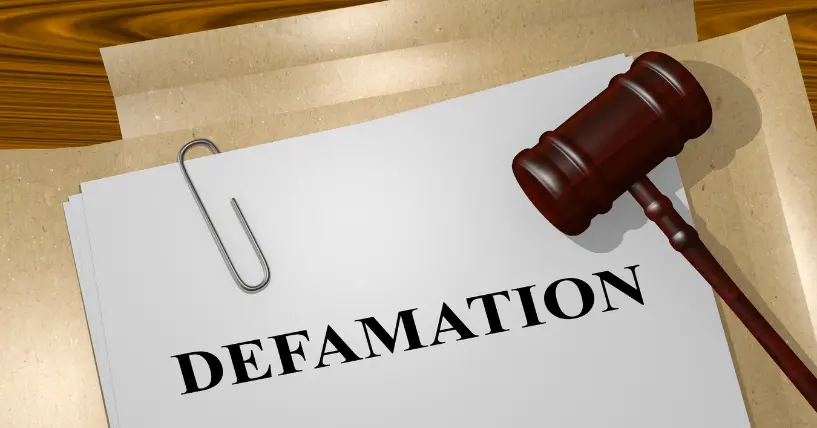
It is not easy to prove character defamation claims in court. As you are the one accusing, the evidence burden depends on you to prove the accused did what you claimed. Though slandering is a tort, it is a civil wrong, not a criminal one. Before you move forward with a defamation case, you must know what defamation of character is.
Defamation is usually a term that can describe a statement that hurts someone’s reputation. Libel is the written form of a statement that can hurt people’s reputations, while slander is the spoken way. In this guide, you will learn how to prove defamation of character.
Libel is the type of defamation statement or representation made in a fixed or printed form. This can involve pictures, text or more; for instance, a photograph used out of context can be considered libel. The individual who publishes the statement or photographs needs to know they are providing false information.
Meanwhile, slander is when a person verbally makes a statement that can be defamatory and can also include gestures or expressions. The person making this statement needs to know they are spreading improper information.
Freedom of speech is not known to protect against libel or slander. People have the right not to be subjected to falsehoods that can malign their character; this is why slander cannot be protected. As the first amendment (freedom of speech) is the most vigorously protected, there are implications and grey areas of defamatory statements, whether protected or not.
The first Defamation amendment bill 2021-22 is not known to safeguard things that can lead to criminal acts or endanger the safety of the public. Saying things that can make the public go wild is not protected by free speech laws. Similarly, forcing another person to commit a crime cannot be protected by the first amendment.
To prove defamation of character, you first need to prove that the statement was a lie or an intentional misinterpretation. But with slander, things can get trickier, and you need to claim that the individual said what you are claiming they said.
The trickiest part of libel lies in the next portion, which is to prove that the defamatory was made intending actual harm. An untrue statement to be thought of as defamatory must be said with the intentional misinterpretation of facts to cause harm to your reputation. The individual must be knowingly lying while being aware that the lie can cause you harm.
Most Defamation lawyers in Perth will tell you that this is a tough part of the process. You need to know that there is a clear difference between a statement having the power to cause you harm and a statement that can actually cause you harm. Defamation of character is only considered when a statement can cause you harm and not the potential to cause you harm.
This can be tricky and frustrating for people who want to prevent damage. The Australian court cannot act on things that may happen until there is proof that the thing has actually happened. If you have already witnessed the negative effects, you might see more if it goes unchecked.
If you want to win the defamation of character claim, you must prove that the false statement has ruined your reputation. If you are a business owner, you must prove that the statement had negatively affected your business. If not, you cannot win this claim.
If you are the only individual who knows about this lie, it cannot be counted as slander, defamation or libel, as it cannot hurt your reputation. It can be counted as blackmail if there is a threat to release this information. The most interesting thing you must know about the publication is that it is not in the modern context where it is published.
It only indicates that it was done in a way where that other person could not see, hear or come across this lie about you. It was only public in a way that a third party was exposed to this statement.
As both defamatory cases and free speech conflict with one another as per the constitution, the court chose to protect specific interactions and scenarios from being brought back to court on defamation cases. The protected interactions and scenarios are called privileged.
Before looking for defamation of character lawyers, you need to know that it includes scenarios where false statements can cause you harm. But you cannot say that these statements cannot face legal action only because they are not considered defamatory or are. But, it is seen that unprivileged statements cover most of the defamatory statements. These statements are made every day offline, Things To Know About Online Defamation And Internet Laws, in courts and chambers.
When slanderous and libellous statements are made in public, the affected person or party needs to seek a retraction before complaining in court. If there is proof of the alleged culprit refusing to take back their statements, winning the case in court will be much easier.
For compensation, the court needs to decide on the level of “reasonable injury”. For instance, if a politician feels offended or defamed by statements connecting them with criminal organizations, the court can consider that individual in the public eye to expect any circumstance.
The damage can be considered less if the statements are not damaging at all. In the majority of cases involving character defamation, the court can seek a resolution that is usually respectful of the first amendment. This indicates accepting a form of retraction from the respondent published in the recorded newspaper.
If someone looks to harm your reputation via defamatory statements, be it slander or libel, you can opt for a defamation of character claim. To help make things easier, you can take the help of Civil Lawyers Perth, WA, to access the best lawyers who can guide you through the legal procedure of gaining justice and bringing back respect to your reputation.